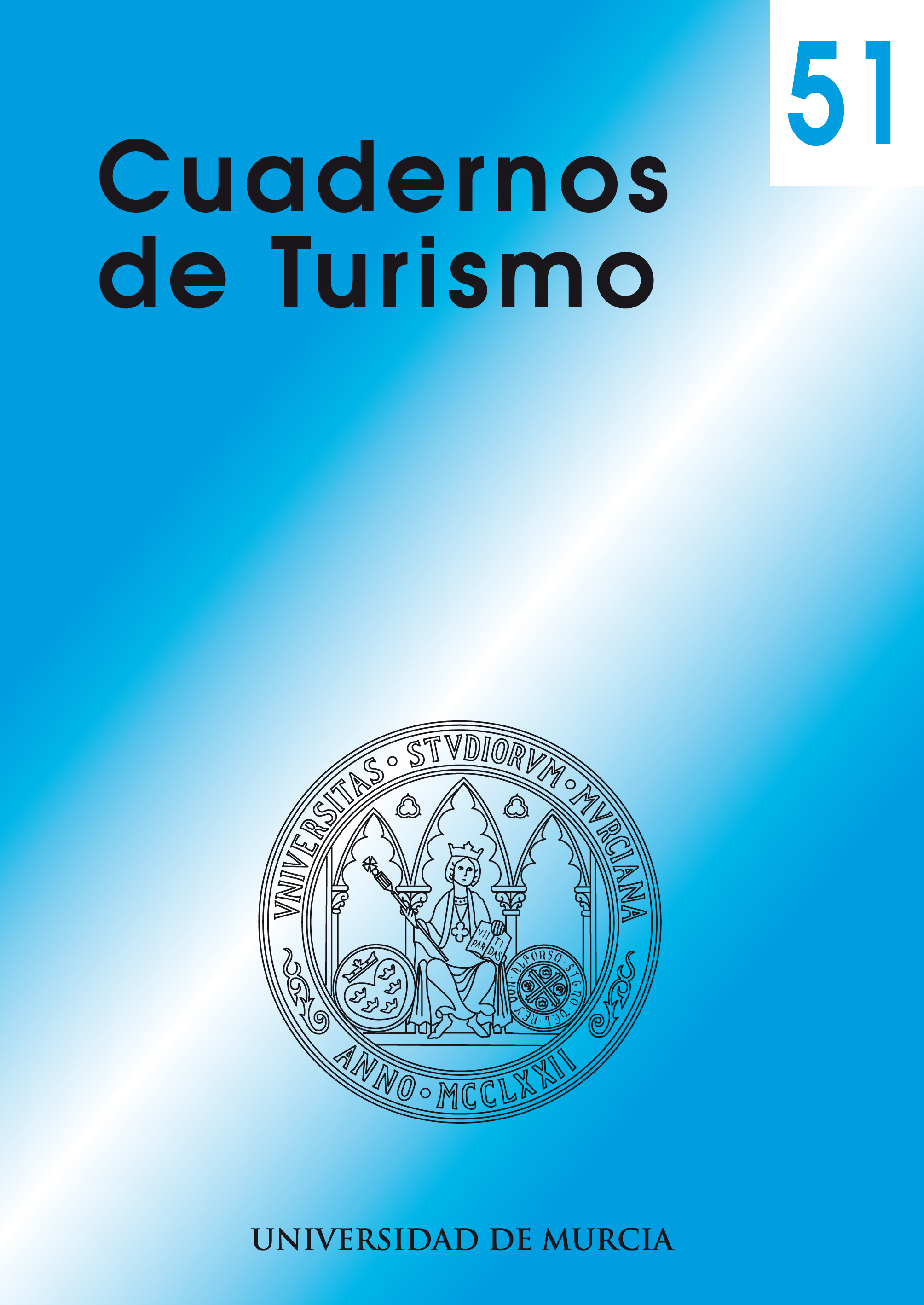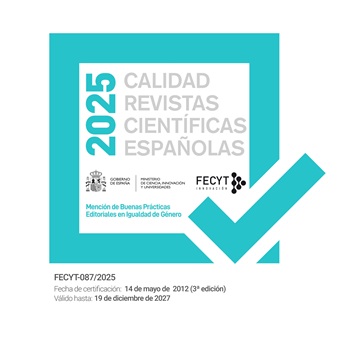HISTORY OF SOME TOURISM DENOMINATIONS IN SPAIN: TURISMO DEPORTIVO, TURISMO CULTURAL, TURISMO MARINERO AND TURISMO GASTRONÓMICO
Supporting Agencies
- Este estudio se inserta en el más amplio proyecto del Grupo de Investigación en Lengua de Ciencia y de le Técnica Neolcyt, titulado El léxico especializado en el español contemporáneo: 1884-1936 (LEEC), financiado por el Ministerio de Ciencia e Innovación de España (PGC2018-093527-B-I00). Además, para su realización ha sido fundamental la obtención de una beca Margarita Salas para la formación de jóvenes doctores, concedida en el marco de las ayudas Next Generation EU para la recalificación del sistema universitario español (2021-2023)
Abstract
The present study proposes to trace, analyze and describe the history of some of the most representative denominations of tourism typologies used in Spain since the beginning of the 20th century. This research is part of the research project El Léxico especializado del español contemporáneo (LEEC) undertaken by the Neolcyt team, funded by the Spanish Ministry of Science and Innovation, and formed by researchers from different Spanish universities, with the aim of developing materials that will serve for the creation of a historical dictionary of the technical and scientific lexicon that is currently lacking in the Spanish language.
Downloads
-
Abstract1608
-
PDF ESPAÑOL (Español (Esp...2053
-
PDF INGLÉS2053
References
-BIBLIOGRAFÍA
BALBONI, P.E. (1989): Microlingue e letteratura nella scuola superiore: guida all'esame di concorso. Brescia, La Scuola.
BAYÓN MARINÉ, F. y CRUZ ALONSO SUTIL, M. (Eds.) (1999): 50 años de turismo español. Un análisis histórico y estructural. Madrid, Centro de Estudios Ramón Areces.
BELTRAMI, M. (2011): Ocio y viajes en la historia: antigüedad y medioevo. EAE, Editorial Académica Española.
BORDONABA ZABALZA, C. (2009): «Neología y formación de palabras», en Calvi, M.V., Bordonaba Zabalza, M.C., Mapelli, G. y Santos Lopéz, J. (Eds.): Las lenguas de especialidad en español, Roma, Carocci, pp. 39-54.
BOSQUE, I. y DEMONTE, V. (Eds.) (1999): Gramática descriptiva de la lengua española. Madrid, Real Academia Española y Espasa Calpe.
BRILLI, A. (1987): Il viaggio in Italia. Storia di una grande tradizione culturale dal XVI al XVII secolo Milano, Silvana Editoriale.
BRILLI, A. (1995): Quando viaggiare era un’arte. Il romanzo del Grand Tour. Bologna, Il Mulino.
CALVI, M.V., BORDONABA ZABALZA, M.C., MAPELLI, G. y SANTOS LOPÉZ, J. (2009): Las lenguas de especialidad en español. Roma, Carocci.
CALVI, M.V. (2010): «Los géneros discursivos en la lengua del turismo: una propuesta de clasificación», Ibérica, nº 19, pp. 9-32.
CASTILLO RAMÍREZ, E. (2005): Tusculum I: humanistas, anticuarios y arqueólogos tras los pasos de Cicerón: historiografía de Tusculum (siglos XIV-XIX). Roma, L'ERMA di BRETSCHNEIDER.
CIAMPICACIGLI R. y MARESCA S. (2004): «The Metalanguages between Sport and Tourism», Symphonya. Emerging Issues in Management (www.unimib.it/symphonya), nº 2, pp. 73-80.
COLTMAN, MICHAEL M. (1998): Introduction to Travel and Tourism: An International Approach. New York, Van Nostrand Reinhold,
COSTADURA, E. (2011): “Il Grand Tour da Montaigne a Heine”, en Luzzatto, S., Pedullà, G.E e Irace, E. (Eds.): Atlante della letteratura italiana, vol. II: Dalla Controriforma alla Restaurazione, Torino, Einaudi, pp. 716-726.
CROCE E. y PERRI G., (2008): Il turismo enogastronomico: progettare, gestire, vivere l’integrazione tra cibo, viaggio, territorio. Milano, Franco Angeli.
GARCÍA DEL HOYO, J.J. y JIMÉNEZ DE MADARIAGA C. (2016): Cultura y pesca: actas de las I jornadas patrimonio cultural pesquero. Huelva, Servicio de Publicaciones de la Universidad de Huelva.
GARCÍA IGLESIAS, L. (1986): «Las peregrinaciones en la Antigüedad», Cuadernos de Prehistoria y Arqueología, nº 13-14, pp. 301-312.
LAROUSSE, P. (1876): Grand Dictionnaire Universel du XIXe siècle. Paris, vol. 15, Administration du Grand Dictionnaire Universel.
LASSELS, R. (1670): The Voyage of Italy, or a Compleat Journey Through Italy. Newly printed at Paris, and are to be sold in London, by John Starkey.
LEY 33/2014, de 26 de diciembre, por la que se modifica la Ley 3/2001, de 26 de marzo de Pesca Marítima del Estado, pp. 105.798–105.825. Texto PDF completo disponible en: https://www.boe.es/boe/dias/2014/12/27/pdfs/BOE-A-2014-13516.pdf
MANCUSO, S. (2004): Per una metodologia della valorizzazione dei beni archeologici: analisi e prospettive in Calabria. Soveria Mannelli (CZ), Rubbettino.
MIECZKOWSKI, Z. (1990): World Trends in Tourism and Recreation. New York, Peter Lang.
MOLINER, M. (2007): Diccionario de uso del español. Madrid, Editorial Gredos, 3ª edición.
OGILVIE, F. W. (1933): The Tourist Movement. Londres, P.S. King.
PASQUALINI, A. (2009): “Preistoria del Grand Tour: “turisti” e “villeggianti” a Roma e nella Campagna romana da Enea a Costanzo II”, en Formica Marina (Eds.), Roma e la Campagna Romana nel Grand Tour, Atti del Convegno Interdisciplinare, Monte Porzio Catone 17-18 Maggio 2008 (pp. 29-49). Roma, Bari, Laterza.
PEGGE, S. (1803): Anecdotes of the English language: chiefly regarding the local dialect of London and its environs. Printed by and for J. Nichols, son, and Bentley, London.
PIGEASSOU, C. (2004): «Sports and Tourism: the emergence of sports into the offers of tourism. Between passion and reason. An overview of the French situation and perspectives», Journal of Sports Tourism, Taylor & Francis Group, pp. 20-36.
REAL ACADEMIA ESPAÑOLA (1914): Diccionario de la lengua castellana, 14ª edición. Madrid, Imprenta de los Sucesores de Hernando.
REAL ACADEMIA ESPAÑOLA (1925): Diccionario de la lengua española, 15ª edición. Madrid, Espasa-Calpe S.A.
REAL ACADEMIA ESPAÑOLA (1992): Diccionario de la lengua española, 21ª edición. Madrid, Espasa-Calpe S.A.
REAL ACADEMIA ESPAÑOLA (2001): Diccionario de la lengua española, 22ª edición. Madrid, Espasa-Calpe S.A.
REAL ACADEMIA ESPAÑOLA (2014): Diccionario de la lengua española, 23ª edición. Madrid, Espasa-Calpe S.A.
RIVERA BLANCO, J. (2014): «El sueño de un visionario», en Miguel Arroyo, C. y Ríos Reviejo, M.T. Visite España. La memoria rescatada. Madrid, Ministerio de Cultura, pp.149-159.
RODRIGO, M. (2008): «Reflexiones sobre el tiempo de trabajo y los descansos en la Declaración Universal de los Derechos Humanos», Persona y Derecho: Revista de fundamentación de las instituciones jurídicas y de Derechos Humanos, nº 59, pp. 295-316.
RODRÍGUEZ NAVAS Y CARRASCO, M. (1918): Diccionario General y Técnico Hispano-Americano. Madrid, Cultura Hispanoamericana.
SECO, M. (1998): Diccionario de dudas y dificultades de la lengua española. Madrid, Espasa-Calpe.
SESÉ ALEGRE, J.M. (2008): “Los juegos olímpicos de la Antigüedad”, en Cultura, Ciencia y Deporte, vol. 3, n.º 9. Universidad Católica San Antonio de Murcia, pp. 201-211.
SIMPSON J.A., WEINER E.S.C. y OXFORD UNIVERSITY PRESS (1989): The Oxford English Dictionary. United Kingdom, Oxford, Clarendon Press.
STANDEVEN J. y DE KNOP P. (1999): Sports Tourism. Leeds, Humain Kinetics Europe.
VELASCO, M. (2013): “Conceptos en evolución: turismo, cultura y turismo cultural”, en Turismo cultural: políticas y productos turísticos, Madrid, ed. Síntesis, pp. 15-45.
- WEBGRAFÍA
REAL ACADÉMIA DE HISTORIA - BIOGRAFÍA DE JUAN CHABÁS: https://dbe.rah.es/biografias/12022/juan-ambrosio-chabas-marti
BOLETÍN OFICIAL DEL ESTADO: https://boe.es/
CORDE – RAE: https://www.rae.es/banco-de-datos/corde
GALLICA - BIBLIOTHÈQUE NUMÉRIQUE DE LA BNF: https://gallica.bnf.fr/
GOOGLE LIBROS: https://books.google.es/
HEMEROTECA ABC: https://www.abc.es/archivo/periodicos/
HEMEROTECA BNE: http://www.bne.es/es/Catalogos/HemerotecaDigital/
HEMEROTECA LA VANGUARDIA: https://www.lavanguardia.com/hemeroteca
ORGANIZACIÓN MUNDIAL DEL TURISMO: http://www2.unwto.org/es
Las obras que se publican en esta revista están sujetas a los siguientes términos:
1. El Servicio de Publicaciones de la Universidad de Murcia (la editorial) conserva los derechos patrimoniales (copyright) de las obras publicadas, y favorece y permite la reutilización de las mismas bajo la licencia de uso indicada en el punto 2.
2. Las obras se publican en la edición electrónica de la revista bajo una licencia Creative Commons Reconocimiento-NoComercial-SinObraDerivada 3.0 España (texto legal). Se pueden copiar, usar, difundir, transmitir y exponer públicamente, siempre que: i) se cite la autoría y la fuente original de su publicación (revista, editorial y URL de la obra); ii) no se usen para fines comerciales; iii) se mencione la existencia y especificaciones de esta licencia de uso.
3. Condiciones de auto-archivo. Se permite y se anima a los autores a difundir electrónicamente las versiones pre-print (versión antes de ser evaluada) y/o post-print (versión evaluada y aceptada para su publicación) de sus obras antes de su publicación, ya que favorece su circulación y difusión más temprana y con ello un posible aumento en su citación y alcance entre la comunidad académica. Color RoMEO: verde.





_.jpg)








